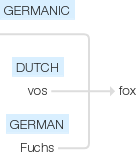Fox
Old English, of Germanic origin; related to Dutch vos and German Fuchs .
wiktionary
From Middle English fox, from Old English fox(“fox”), from Proto-West Germanic *fuhs, from Proto-Germanic *fuhsaz(“fox”), from Proto-Indo-European *púḱsos(“the tailed one”), possibly from *puḱ-(“tail”).
Cognate with Scots fox(“fox”), West Frisian foks(“fox”), Fering-Öömrang North Frisian foos and Sölring and Heligoland fos, Dutch vos(“fox”), Low German vos(“fox”), German Fuchs(“fox”), Icelandic fóa(“fox”), Tocharian B päkā(“tail, chowrie”), Russian пух(pux, “down, fluff”), Sanskrit पुच्छ(púccha) (whence Torwali پوش (pūš, “fox”), Hindi पूंछ(pūñch, “tail”)).
etymonline
fox (n.)
Old English fox "a fox," from Proto-Germanic *fuhsaz "fox" (cognates Old Saxon vohs, Middle Dutch and Dutch vos, Old High German fuhs, German Fuchs, Old Norse foa, Gothic fauho), from Proto-Germanic *fuh-, from PIE *puk- "tail" (source also of Sanskrit puccha- "tail").
The bushy tail also inspired words for "fox" in Welsh (llwynog, from llwyn "bush"); Spanish (raposa, from rabo "tail"); and Lithuanian (uodegis, from uodega "tail"). Metaphoric extension to "clever person" was in late Old English. Meaning "sexually attractive woman" is from 1940s; but foxy in this sense is recorded from 1895. A fox-tail was anciently one of the badges of a fool (late 14c.).
A late Old English translation of the Medicina de Quadrupedibus of Sextus Placitus advises, for women "who suffer troubles in their inward places, work for them into a salve a foxes limbs and his grease, with old oil and with tar; apply to the womens places; quickly it healeth the troubles." It also recommends, for sexual intercourse without irritation, "the extremest end of a foxes tail hung upon the arm." Rubbing a fox's testicles on warts was supposed a means to get rid of them.
Fox
name of an Algonquian people (confederated with the Sac after 1760), translating French renards, which itself may be a translation of an Iroquoian term meaning "red fox people." Their name for themselves is /meškwahki:-haki/ "red earths." French renard "fox" is from Reginhard, the name of the fox in old Northern European fables (as in Low German Reinke de Vos, but Chaucer in The Nun's Priest's Tale calls him Daun Russell); it is Germanic and means literally "strong in council, wily."
fox (v.)
1660s, "to delude" (perhaps implied in Old English foxung "fox-like wile, craftiness"), from fox (n.). The same notion is implied in Old English verbal noun foxung "fox-like wile, craftiness;" and Middle English had foxerie "wiliness, trickery, deceit." Foxed in booksellers' catalogues (1847) means "stained with fox-colored marks" (rusty red-brown). In other contexts the past-participle adjective typically meant "drunk" (1610s).
